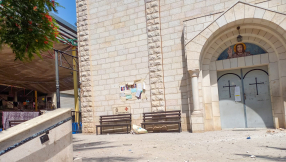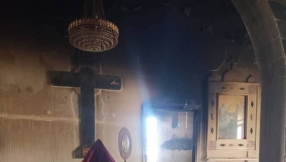Re:Creation - A modern day Messiah
DW: I’m a URC minister. I did 15 years in the East end of London in Newham. I retired or I was forced to retire because I reached retirement age and I was very unhappy about being forced to stop something I loved doing. People said “Now you can do what you like”. I said “For 40 years I’ve been ministering in churches, I’ve always done what I liked, so don’t stop me now!”
It was inevitable though and I was kicking and screaming about something out of my control basically. The only other thing I wanted to do, because I love music, and my wife is a music teacher and coach, was write a version of the biblical story for choral singers, in a device called oratorio – like Handel’s Messiah.
There is a phenomenal interest in choir singing. There are 25,000 choirs up and down the country which are registered and also spontaneous local church choirs that are not registered and cathedral choirs and that kind of stuff.
Vast numbers of them perform Christian material. They perform sacred works by Handel or Bach or Haydn - Haydn’s Creation is one particularly that inspired me. But what we thought was that all this stuff is brilliant music, but it’s in old English, King James English, or Latin or German. Like Bach’s nightly Passion – the whole Gospel week of the Passion and the crucifixion are described – but it’s all in German.
There are very few good English translations and it’s not sung in English anyway. So what I wanted to do was put together a libretto – a text – which is lifted from the Bible, cut and pasted from new biblical translations like the New International Version and the American Standard Version and so on.
A lot of schools do Joseph and his Amazing Dreamcoat. Not that they use much Bible – they use Bible stories. But my view was that I wanted Scripture to be sung in a credible and accessible way so that people who are new to the Bible have to come to terms with it because it is in language they can’t run away from.
CT: How did you set about making the dream a reality?
DW: All the while in the background was a friend of mine from the Surrey area in Guildford. We did seven or eight music programmes together before, some of which have been televised and a number of which have been used for fundraising for churches in the Newham area.
His name is David Perkins and he is the youth director for music at the Yvonne Arnaud Theatre in Guildford. He makes youth musicals and a couple of musicals for adults. He has a wide variety – he is a jazz pianist, and does Scott Joplin and that kind of thing. He does quite a wide style of music.
But over the years, partly through my influence I think, he has developed a sacred works portfolio. He wrote a song which was prepared for him by a guy who was dying of cancer named Terry Reid. He was dying of cancer and he was a lapsed Catholic. But he came back to faith when he discovered that he was likely to die from the disease.
In the latter months of his life he read the Catholic missal, he read the Psalms and he took eight psalms which tracked his spiritual history back to the Lord, through grief, through tears, through anxiety and eventually through a resignation and back to faith.
On the day of his funeral, his family gave his extracts from the Psalms to my friend David and said, “This is Terry’s legacy to you. Will you write some music to fit it?”
|PIC1|As a result he wrote a piece called “Song of Psalms”, all of which was sung very beautifully and very movingly because of people's respect for the guy who died. It had a very high rating in the local area here in Guildford by a number of singers.
So David Perkins enjoys a very good reputation in his area as a composer both for lightweight youth musical as well as increasingly in the genre of sacred music. So I gave him the 150 verses that I cut and pasted from the Bible to turn into a piece of sacred music.
I have adapted the Bible verses mildly to make it poetic and to give some continuity.
My aim is to have people sing the Bible – not to sing poetic versions of things which are based on the Bible – the point is that they cannot avoid scripture and the references. So every time we perform the material, the verses being sung are reproduced in the programmes so that they can see it.
CT: What’s the theme of Re:Creation?
DW: There are five movements, the whole thing is called Re:creation. The first movement is very much the interaction of the Trinity, Father, Son and Spirit in the words of the concept of creation. It’s very much exploring the divinity of Jesus, the created mode that the Father and the Spirit agreed to.
It takes passages from John 1 and Genesis 1 such as “in the beginning was the word” and passages from Colossians where it says that Jesus is the image of the invisible God, and all things that are related to that. It talks about who Jesus is, what his work is in the creation, how he combines with the Godhead. It’s quite strong theology about the nature of Jesus and the nature of who God is and it finishes with kind of the equivalent of Handel’s Messiah that Jesus is the same yesterday, today and forever, from Hebrews.
The second piece is about creation. Bear in mind the title of the work is Re:creation. I listened to Haydn’s “Creation”. Great music, very little Bible, quite a bit from Genesis 1 and 2, but a lot of 18th century poetry, which is very florid and interesting but it’s not Bible. So it goes into the concept about God creating man – some wonderful pieces about man but its all conjecture and poetry. Great stuff but it’s not Bible.
That was partly my disappointment that this is a great theme of creation, but the proportion of sung Word is quite low when you look at scripture. My view was to do the opposite. Everything that people listen to would be scripture in acceptable language.
So then in part two we look a little bit of Genesis, like “God saw all that he had made and it was very good”. But most of it is from the Psalms. Like Psalm 8. It speaks again about God creating all living things – you could say it’s the National Geographic part.
It talks about God the Creator of all living things and the Creator of the material world, from Job and Isaiah. People cannot get away from reading the scriptures in this.
No one has heard this before. When we rehearsed this, about 50 singers from the Guildford area and the few of us who were Christian in the choir were in tears because it’s so moving. One guy had to sit down, even during the performance he could not carry on because it’s so moving.
It’s God’s work. I found stuff in the Bible I did not even know was there. God’s leading on this is quite phenomenal. I am not a great Bible scholar. I just love music and I love the Word. I gave this whole project to God. I said, “It’s your stuff, you do it well and use it the way you want to and you do the rest. And he did!”
Section two follows the sequence of creation just as I Genesis 1 there is a sequence. God cannot create an animal unless he first creates an environment in which the animal can live. Genesis 1 makes incredibly good sense, Darwin notwithstanding.
|PIC2|Material world, liquid masses, climatic phenomenon, snow, hail, beautiful stuff from Job 8, which I twisted. I slightly amended scripture. The Lord speaks to Job saying, “Where you there when I…” I turned it round to make statements about God. So it becomes a statement about the nature of God, like “He was there when…”
Then the third bit is the Gospel all over again. God sets it up beautifully but still we revolt, we rebel. The third section is about humanities failure. A lot from Jeremiah, some of this stuff I did not even know was here. “Even stalks know when it’s time to return, but my people – you do not know” Did you know that was in the Bible?
I’ve been doing ministry and preaching for 40 odd years and I never came across that at all. An image that speaks about man’s rebellion by saying that even the birds of the air know their stuff but we messed up.
It’s not down to my cleverness. It is down to the leading of the Holy Spirit saying “Derek do you know this bit?”
Part three finishes with God’s design for man like in 2 Chronicles – if my people, despite their failings, humble themselves and turn to me I will hear from heaven.
So then we finish part three and we come to the New Testament.
It’s the introduction of the Jesus incarnation. So in a sense we have a degree of Christmas music although it reflects that in part one – of God intervening. Isaiah and Romans 7 – We are longing for God – what we want to do we do not do, what we do not want to do we do, will anyone rescue me? Yes Jesus will.
Then there is a lot from Romans. It’s not the Gospel like other choral pieces about Jesus which focus mainly on the Holy Week and the crucifixion and the death on the cross. I have deliberately avoided that with a view to show what the Bible says about what Jesus achieved. Not that he did it – but what it meant. I think that’s exactly what Apostle Paul was doing. In his writings in Romans and Colossians it’s talking about the restoration brought by Jesus. So the fourth movement is God’s creativity being restored.
The restored people of God rejoice. It finishes with Psalms 103 where it says how God forgives all my sins.
Then part five – this part is taken from Revelations – it talks about now we are elected and chosen by God – we are adopted into his family – so we become his children.
We have John 1 – where it says he gives the right of those who seek him to be called children of God, and then provides his children with new homes and new bodies. It has 2 Corinthians, our physical bodies die but our spirit is renewed day by day.
And the one they is always read at funerals – in my father’s house there are many rooms - and also Philippians – we are citizens of heaven and are waiting for Jesus return.
Finally the summation of Christianity is God's new city and new earth in Revelations. I should think for the very first time ever in whole of Christian music – the 12 precious stones in the walls of Revelation are being sung about – jasper, sapphire, chalcedony, emerald, sardonyx, carnelian, chrysolite, beryl, topaz, chrysoprase, jacinth and amethyst.
|PIC1|To my knowledge it’s never ever been sung but it’s a beautiful soprano solo and is repeated by the choir.
It’s all in there about God’s new heaven and then we return back to where we started. In the beginning of all things there was God and at the end there is God. The God who is and was and always will be. In the beginning there was the Word and at the end of all things was the Word. At the end God will make a new heaven and a new earth.
CT: What has been the reaction to Re:Creation so far?
DW: When we did these two performances in Guildford we got a standing ovation.
In making this I was anxious that I handle the Bible fairly, because if you take excerpts from the Bible you are by definition not giving the whole message. But 32,000 verses are a lot to sing in one go so inevitably it’s limited.
Handel’s Messiah covers about 80 verses, I’ve covered 150 because I gave myself a bigger canvas than Handel did. It sounds a bit presumptuous to compare ourselves with Handel’s Messiah, but in a sense we are only doing what Handel did in the first place. Someone gave him a script in his own 18th century language, English or maybe German, and he set it to music. We are basically doing the same thing.
It is an attempt to give the Gospel story from beginning to end and to keep the integrity of the message and what I find very comforting is that people have come to me and said, “This is a good extract – you have not missed out much and you have covered it faithfully”.
I can say that without being arrogant because it’s not my work. I’m just there most of the time. I say God that is great. There are some lovely touches in it.
Most of the people involved in this are not Christians and so most of the people who sang did so because they like David Perkins’ music. A lot of them came to me and said, “This is amazing, where did you get this stuff from?” I say, “It’s all in the Book! Just read the Book. If you won’t read the Book just read this because hopefully this shows you what the Book will tell you”.
So I’ve had that response and that has been very satisfying. That fuels my faith to know that God is in it. It will not die tomorrow. As long as contemporary English is contemporary and this translation is reasonably acceptable then it’s got a life.
CT: Which books of the Bible especially inspired you while making this?
DW: I love the Gospel – I’m a very Jesus Christian – but I’ve avoided the Gospels because I did not want to reproduce what has been done brilliantly by some of the older composers – for example looking at the Passion Week.
So I found myself in Job and the Psalms – they are part of the poetry of the Old Testament anyway. So they are known as the wisdom books and song books of the Bible. I found myself naturally going there and then found myself naturally, and in some ways unnaturally, getting stuff out of Colossians and Romans and from some of the heavy theology that Apostle Paul wrote, and then Revelations – there are so many great pictures there.
So in a sense the Bible inspired me by some of its poetry and vivid imagery that describes eternal themes. It inspired me with some brilliant poetry and lovely visual images which I found in Job, Psalms and Revelations and some of the more conventional writing in the Epistles.
CT: How do you hope that Christians and non-Christians will react to Re:Creation?
|PIC2|DW: I hope Christians will be inspired to see the whole thing all in one shoot - to see this is God’s big picture - and to say it gets under my skin as well as into my brain, because He is so gracious – such a brilliant creator and a loving redeemer and He has an ultimate plan for the restoration of the planet – for those who believe in Him.
For non-Christians I just want them to be stimulated to read the Book themselves and to meet up with Jesus.
CT: What are your future plans for Re:Creation?
DW: What we are doing is presenting it – because the dream is to present this worldwide and for Christians who sing in English to be singing this all over the world. The way to get it out there initially is to have the full professional performance, which we are running on 22 April at St John’s church.
The London Premiere of "Re:Creation" will be held at 7:30pm on 22 April at St John's, Smith Square, London.
Box Office: 020 72221061
Book Online: www.sjss.org.uk













